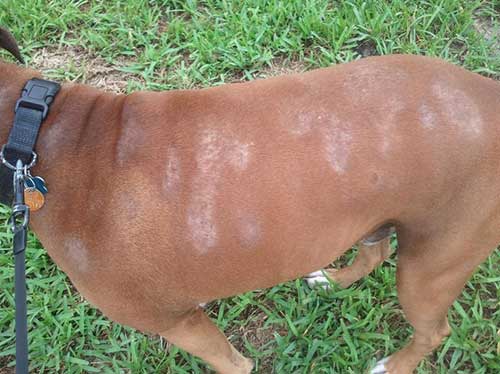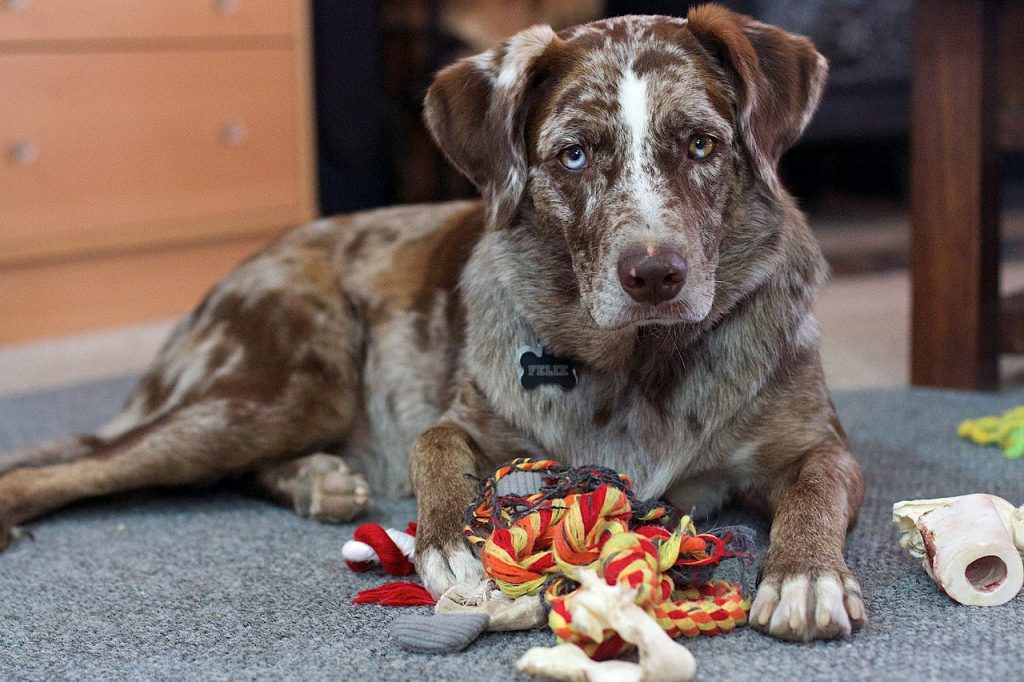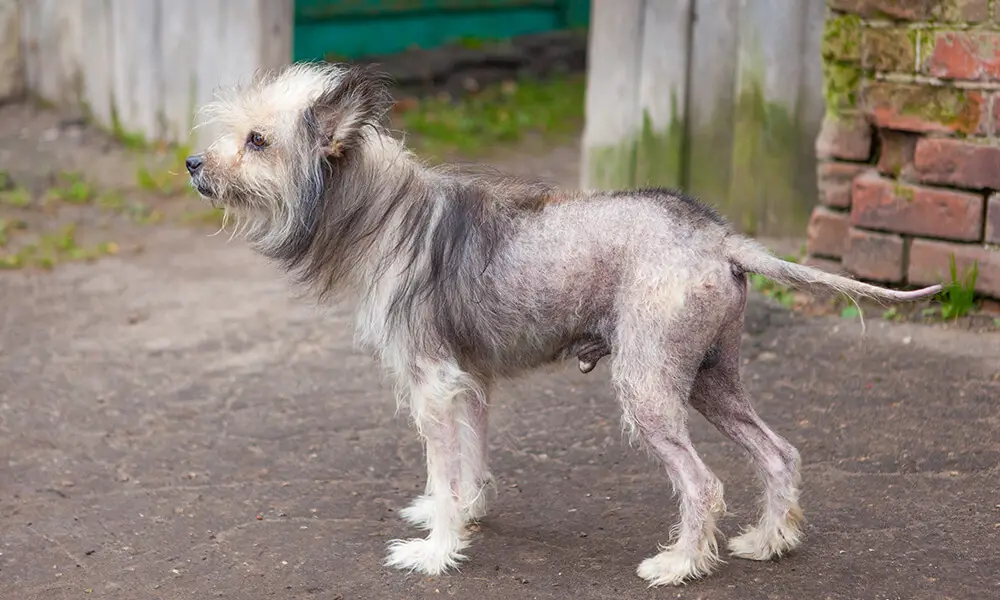Before you ask What Causes Hair Loss In Dogs, you should first ask about the (alopecia) or hair loss itself, it’s a common disorder in doggies which causes partial or complete hair loss to our dogs. It’s able to affect a dog’s skin, not just that, also it can affect its endocrine system, its lymphatic system, and its immune systems as well. Alopecia is able to affect dogs of all ages, breeds, and gender, none of them have immune against it, and is either gradual or acute.
Table of Contents
What Causes Hair Loss In Dogs?!
There are many reasons that causes hair loss in dogs and here are the most common 5 causes…

1. Allergies
Of Course, Allergies are a frequent cause of hair loss in doggies. it could be because of environmental triggers like pollen, molds or even dust mites, or it might be because of parasitic triggers such as fleas or mites.
Food allergies can be another possible cause of hair loss to dogs. Typical symptoms of an adverse allergic reaction will include:
- itchiness resulting in excess scratching
- biting
- and, of course, hair loss
In the case of having a flea allergy, it is recommended that dogs take flea preventatives immediately as a way to minimize the threats of a full-blown flea infestation.
2. Infection or Infestation
The infestation with parasites such as fleas, ticks, and mites (scabies, mange) can be another source of canine alopecia. most of the time, besides hair loss around the ears, eyes, abdomen, and chest, also the dog may have mites or fleas/ticks, not just that, it also can include inflammation, itching, and of course redness.
Bacterial or fungal infections, like in the case of ringworm (which is, as a matter of fact, a fungus), can also be a very good reason for hair loss in dogs. Symptoms of ringworm include:
- circular or irregular hair loss
- inflammation
- infected crusts.3 of 6
3. Cushing’s Disease
Hyperadrenocorticism, ‘ a long hard word huh!’ let’s explain the easy meaning of it, this Hyperadrenocorticism is also known as Cushing’s disease, it’s a condition caused by a dog prolonged exposure of his body’s tissue to extravagant levels of the hormone cortisol.
Symptoms of Cushing’s disease surely include:
- hair loss
- darkening of the skin,
- development of a pot-bellied abdomen.
Cushing’s disease most commonly occurs in middle-aged to senior doggies, that’s not just it, it can also affect dogs that overuse corticosteroid drugs.
4. Genetics
You will find some breeds of dog that are More genetically susceptible to baldness than others. First, of course, there are the hairless dogs that have been already born with no hair and have been known for it such as the Chinese Crested, Mexican Hairless (which also called as Xolo), and the beautiful American Hairless Terrier.
Also, Other dog breeds, like the Doberman Pinscher, Dachshund, Chihuahua, Italian Greyhound, and last but not least the Whippet, sometimes suffer from patchy or pattern baldness which could be on the outer ear, chest, back, thigh, or other like the lower neck.
5. Pressure Sores
Pressure sores or you will find it called as bedsores or decubital ulcers, it’s localized injuries which can happen to your doggie easily if you are not taking good care of him or he is playful and energetic more than usual of simply can happen by accident, where the dog’s elbows or other bony pressure points (hips, hocks, etc.) Get in touch with hard surfaces regularly. This constant pressure and friction may cause the skin to callus, lose hair or sometimes crack and bleed.
Pressure sores usually more common older dogs, especially large or heavy breeds. it doesn’t mean that it won’t happen to puppies, but its percentage will be higher in older dogs which means that older dogs need more protection and care

General Symptoms of Hair Loss:
- Overall thinning of the dog’s hair
- Hair loss around your dog’s eyes and mouth
- Patches of complete hair loss start to appear
- Symmetrical patterns of hair loss in the same place on his body from both sides
- Foul odor
- Itchiness
- Black or dark grey skin under hair loss
- Dry, scaly skin around the area of hair loss
- Red, inflamed skin around the area of hair loss
- Oozing moisture or bleeding around the area that already Suffering from hair loss
General Causes of Hair Loss:
- Pressure Sores
- Nervous chewing or licking
- Foreign body reaction (thorn, splinter, glass)
- Trauma and/or scarring
- Post-surgical clipping
- Infection (Bacterial, Yeast or Fungal, Viral)
- Ringworm (Fungal infection)
- Allergies (Fleas, Food, Environmental)
- Allergies to shampoos
- Recent vaccination (scleroderma)
- Mites (Mange)
- Insect Bites
- Diabetes
- Thyroid disorder
- Cushing’s disease
- Sex hormone imbalance
- Chemotherapy
- Skin cancer
- Genetics
How to Treat Hair Loss?!
First, you Have to take your Dog to a vet so he can tell you the reason for the hair loss in him, then Depending on the diagnosis, one of these may be the treatment…
Antibiotics (oral or topical) for bacterial infections
Antifungals (oral or topical) for yeast and ringworm infections
Steroid for certain skin conditions
Immunosuppressive Drugs or Anti Cytokine Drugs for environmental allergy control. “Often life long treatment will be needed”.
Immunotherapy (orally or by injection) for allergy desensitization.
Behavioral medications will treat nervous chewing or licking.
Medicated shampoos or dips will treat cases of mange.
Also You May Find…
Hypoallergenic diets are required to solve hair loss due to food allergies. food
Allergies should take some time to define. The vet should recommend a prescription or hypoallergenic diet and sure he will explain the proper method of transitioning to the new diet.
Monthly flea preventative will clear up hair loss which associated with flea allergies.
Insulin therapy most of the time clears up hair loss associated with diabetes.
Thyroid medication and hormone therapy are the treats to reverse hair loss in hormonal and endocrine disorders.
Vitamin E, Vitamin A, and fish oil supplements surely will be recommended for pets who have certain conditions of dry skin or skin infections.
- Surgery may be required to remove sections of skin cancer or tumors.
Seeing your dog lose his or her hair can be disconcerting. However, what’s a most important thing when you are dealing with alopecia, as it is referred to medically, is identifying the underlying cause of your dog’s hair loss in order to devise an appropriate treatment plan.
So you should know is don’t ever try any of these treatments except by the doctor’s orders cause you won’t know which one is the right case for your dog, and always pay close attention to your doggie and if any sign of the mentioned above appears, take him to his vet ASAP to avoid any bad consequences.
Also you can read about 7 Dog Hair Loss Home Remedies You Should Try

